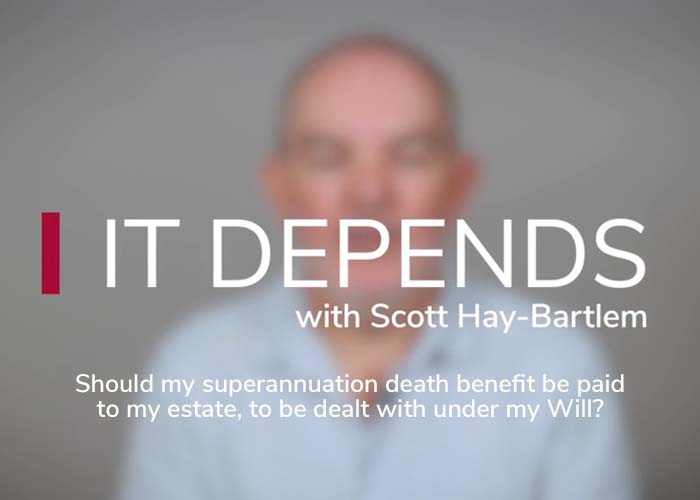In this special extended edition of It depends, partners Scott Hay-Bartlem and Clinton Jackson talk about the proposed tax on super balances over $3 million.
Scott and Clinton will be presenting on this topic at our Annual Adviser Conference on 23 and 24 March 2023. Register now to attend in person or online.
Video transcript
Welcome to this edition of It Depends when we’re going to talk about the government’s proposed new tax on superannuation balances over $3 million. Now, this is a bit of a longer one because there’s a bit of detail in what’s happening. It’s also only a proposal so we don’t have the rules yet. We’ll talk about this in more detail at our Super Update, which is part of our Annual Adviser Conference that we’re holding in Brisbane at the Sofitel on 23 March and also virtually online.
Will it apply to me?
It depends.
When will it apply from?
So, as I said, the new rules are only proposals at this stage. If they come in, they’ll apply from 1 July 2025, a couple of years away.
To whom do the new rules apply?
It applies to anyone with a total superannuation balance of more than $3 million at the end of the financial year. So, the first financial year will be 30 June 2026. Now, it applies to all your super in all your funds. So, if you have more than one fund, you have to add them all together for your total superannuation balance. Now, at the moment they’re saying it will affect 0.5% of people or 80,000 in the first year.
Is the $3M indexed?
No, the $3 million cap is not indexed, it’s fixed. So, while your super balance may go up and down, it’s going to stay there. Now, that means a couple of things. Number one, that it’s really, given it doesn’t apply for a couple of years, about $2.5 million in today’s money. So, it’s not as generous a cap as it might seem. The forecasts are that as people’s superannuation balances grow, it’s going to affect more like 10% of people within the next 30 years or so. So, it’s that non-indexation, it’s a bit of a catch.
What rate is the new tax?
The tax rate is 15%. Now, one really important thing is it is a new tax. We are not doubling the tax rate on current accumulation balances. The tax rate of 15% would be payable on a portion of the earnings associated to that member who has a balance of more than $3 million at the end of the year.
What is the proportion?
So, the tax is payable at 15% on a portion of the earnings. The proportion that we have to look at is a purely mathematical calculation. It’s your total superannuation balance at the end of the year minus $3 million divided by your total superannuation balance at the end of the year. So, as an example, if your total superannuation balance at the end of the year is $4.5 million subtract $3 million to get $1.5 million. Divide that by $4.5 million again and you find that it’s about one third of your superannuation balance is over the $3 million and that’s the proportion that we apply the 15% tax times earnings.
What is earnings?
So, earnings is going to be a really key concept of this new tax. So, how do we work out what our earnings are? Because it’s not any concept that we currently have in the tax system. So, we’re going to use this new formula to work out earnings. Now, how we do that is we take our total superannuation balance at the end of the year less our total super balance at the start of the year. Then we add back in withdrawals and we take away contributions to get us to this earnings figure.
So, when we look at Scott’s example from the previous section, we look at our total super balance being $4 million at the start of the year and if we have a total super balance of $4.5 million at the end of the year, our earnings will be $500,000. Now, when we work out earnings, we do include unrealised gains and that is one issue that has obviously been a pretty hot topic in the media for this new tax.
What is the tax calculated on?
Okay, so the tax calculation is a formula. It’s 15% tax rate multiplied by earnings, multiplied by that proportion. We’ve talked about each of those concepts. So, using the example we’ve been using, if your total super balance at the beginning of the year is $4 million, your total super balance at the end of the year is $4.5 million, it’s 15% times that $500,000 worth of earnings multiplied by that one third proportion, which is the amount your balance is over the $3 million and that gives you an extra tax under the new proposed rules of $25,000 for that year.
Who calculates the new tax and who pays?
So, the ATO will calculate this new tax for you, very much like the Div 293 tax. Once you’ve lodged your returns for the year, you’ll get an assessment issued to the member personally. Now, the member can choose to pay that out of their own funds or withdraw that money from super. Now, if they have more than one fund, they will be able to choose which fund to take that money from in order to pay their tax assessment.
What if my super goes down?
So, if your super goes down in a year, you will have negative earnings. There’s not much detail about how this works, but if you have a negative, a loss in one year, the proposal is you can use it to offset future years’ earnings and increases. The catch being what if your super never recovers from a loss or it’s the last year of the fund and we’re winding it up. Don’t know that yet.
So it doesn’t apply on death?
Well it depends. At the moment we only have a fact sheet and unfortunately it doesn’t have a lot of detail in relation to how it will apply in unique situations such as death. One of the concerns that we have is where you have a couple and one of the spouses dies, what will happen as part of their death planning, in terms of how this tax will be applied? For example, say we have a situation where on the death of the first spouse we have a pension paid to the surviving spouse. Now, based on the formula that we have at the moment, the addition to the total super balance of the surviving spouse will be an increase and go to earnings. Now, if that puts that spouse over $3 million, then the new tax will apply. The issue is will it apply to the death benefit pension that has been allocated to their account from a taxing point of view? We also have an issue for the deceased spouse when they die and we say take that withdrawal out of their balance. Do we have to add that back in for the purposes of working out whether they still have to pay the tax in the last year, even if it’s paid as either a pension payment to the new spouse or as a lump sum withdrawal?
So, there’s a lot that we don’t know about death and the concern is that we could end up paying tax twice, both in the deceased member’s account and in the surviving spouse’s account if we are allocating it as a pension. So, a fair few things that we want to get some more detail on there. And I think it’s going to be a really key thing that we need to look at as part of the death planning strategies that we implement for our clients.
What about insurance?
Okay. So, when a member dies and insurance is paid and allocated to their account, that will give rise to an increase in your total superannuation balance. So again, you’ve got the question of how will the tax apply? Now, if that increase is still in your account at the end of a year, then you’re over the $3 million, you would be seen to have that insurance included in your earnings and end up being taxed on that. If it’s paid as a benefit, then that would seem to be a withdrawal. And again, if it takes you over the $3 million and you add it back in, do you end up paying tax on the insurance? So, like death, it’s an area we need to see more about.
What about family law?
Another area where we don’t have a lot of detail is how the rules will apply to family law settlements. Now, where we have a family law settlement, allocating super between the spouses is another area of negotiation. So, if your family law settlement is going to result in a super split from one spouse to the other, and that’s going to put them over $3 million, then we have questions to how these rules will apply. Once I have that balance over $3 million, we’re into this new tax. The issue will be will the superannuation split that gets added to the spouses balance be included in earnings and also be taxable?
Can I reserve my income rather than allocating it to members?
It depends. That’s three in one video. We’re doing well today. So, allocating to reserve is a very high-risk strategy and the ATO really doesn’t like it and they put lots of material out on reserving. The benefit of reserving in this context is that what you put of the income of the fund into a reserve, doesn’t go into your members’ accounts and won’t count to your total superannuation balance. So, if we’re able to reserve income in a year rather than allocate it, you may be saving the proposed new tax because your total superannuation balance won’t have gone up as much. Now, this may be dealt with in the final rules and it is a very high risk, aggressive strategy.
What should I do?
Currently, this is only a proposal. We don’t have a lot of detail as to how this new tax will actually be implemented. So, the devil will be in the detail. Some of the issues that we’ve talked about today may not actually be issues at all. However, once we actually get the legislation, we may have further issues that we need to explore. So, we need to make sure we are watching this space.
Now, people keep saying people shouldn’t make contributions because that could cause them to go over the cap later in life. Now, there’s such a limited ability to make contributions to super at the moment, where we think you need to be really careful before you adopt such a strategy. There are certain things that you should consider, such as making small business CGT concessions and downsizing contributions. Those really large ones that will have a, I guess, a drastic increase to member balances, you should think carefully before making those. However, often you only get one bite of a cherry for those types of contributions. So, be really careful if you’re electing not to do that.
Wow. There is just so much in this. It’s the biggest It depends ever. Now, we have given you really, a really broad summary only. Now we’re going to cover this in more detail at our Annual Adviser Conference. The Thursday afternoon is our super update. So, come along 23 and 24 March virtually and live here at the Sofitel in Brisbane. More detail, contact one of us, come along to our conference. Thanks for watching this edition of It depends.






